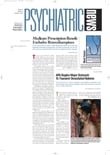Although only a small percentage of North Americans experience full-blown seasonal affective disorder—about 1 percent of Americans and 2 percent of Canadians—a much larger percentage—between 10 percent and 15 percent—report depression accompanied by increased eating and weight gain during the fall and winter. Moreover, of this larger percentage, a substantial number also engage in binge eating.
Now a gene variant linked to seasonal affective disorder binge eating appears to have been identified. It is a variant of the dopamine-4 receptor gene called the seven-repeat allele.
The study was headed by Robert Levitan, M.D., an associate professor of psychiatry at the University of Toronto. Results appeared in the November 2004 Biological Psychiatry. “Pending replication in other samples,” the scientists wrote, “these results point to a genetic vulnerability factor that could help in the early identification and treatment of women at higher risk for seasonal weight gain associated with binge-eating behavior.”
The dopamine-4 receptors appear to be active in limbic areas of the brain involved in cognition and emotion. There are seven known variants of the gene that codes for these receptors; the seven-repeat allele is one. Between 25 percent and 35 percent of Caucasians and up to 65 percent of some American-Indian populations possess at least one copy of this version.
Levitan and his colleagues previously found a link between the seven-repeat allele and obesity in women with seasonal affective disorder, implying that the allele might bring about weight gain via binge eating. They then undertook another study to investigate this hypothesis.
The study sample consisted of 131 women, mostly Caucasian, who met DSM-IV criteria for major depression with a winter seasonal pattern and who were also found, with the Structured Clinical Interview for DSM-IV, to engage in increased eating during winter depressive episodes. Using the same instrument, the researchers found that 32 of the subject engaged in binge eating.
Blood samples from the subjects were sent to the Center for Addiction and Mental Health Neurogenetics Laboratory, where DNA from white blood cell samples from the subjects were examined for various versions of the dopamine-4 receptor gene.
Of the 131 subjects, 46 (35 percent) had at least one version of the seven-repeat allele. Further, these 46 subjects had a significantly greater maximal lifetime body-mass index than subjects without the version. Moreover, of the 46 subjects with at least one version, 18 (39 percent) engaged in binge eating, whereas only 14 of the remaining 85 subjects (17 percent) did so—a highly significant difference.
So the seven-repeat allele may be responsible, at least in part, for excessive weight gain during winter depression and may bring about that weight gain via binge-eating behavior.
The finding has some early-detection and even prevention implications, Levitan said in an interview. “For example, one could follow kids who have the seven-repeat allele. .to identify emerging mood disorders and increased eating behavior as early as possible. Early intervention with a variety of modalities could help prevent the full-blown seasonal affective disorder–binge eating syndrome from developing. This would also be a high-priority group for nutritional counseling and exercise programs early in life.”
The result might also lead to some novel treatments for winter depression binge eating, Levitan noted. But first, he stressed, the result must be replicated in other studies, “then one must understand the actual mechanisms involved. Where in the brain is this mediated? How does the gene affect brain function?”
Also in need of exploring is whether the seven-repeat allele that has been associated with seasonal affective disorder binge eating is the same seven-repeat allele that has been linked to attention-deficit/hyperactivity disorder, impulsivity, novelty seeking, and substance abuse. If the same seven-repeat allele is implicated in all of these disorders, then “binge eating may be just one manifestation of a genetic vulnerability that leads to many behavioral problems over time in the same individual,” Levitan speculated.
The study was funded by the Ontario Mental Health Foundation and the National Alliance for Research on Schizophrenia and Depression.
An abstract of “The Dopamine-4 Receptor Gene Associated With Binge Eating and Weight Gain in Women With Seasonal Affective Disorder: An Evolutionary Perspective” can be accessed online at<www.elsevier.com/locate/biopsych> by clicking on the November 1, 2004, issue, and then the report title. ▪
